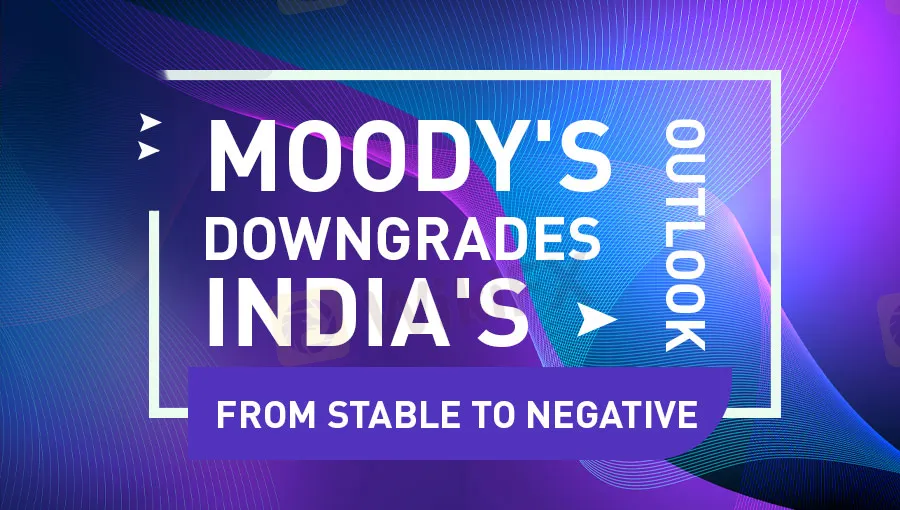Moody’s Downgrades India’s Outlook from Stable to Negative
摘要:Moody's Investors Service downgraded its outlook on India's ratings from “stable” to “negative”, citing rising risks to India's economic growth. Tumbling down to its lowest level in three weeks, the rupee fell as much as 0.5% against the US dollar to 71.31 at one point, the first decline in three weeks; the Indian stock market also dropped as the NSE index fell 0.4%.

Moody's Investors Service downgraded its outlook on India's ratings from “stable” to “negative”, citing rising risks to India's economic growth. Tumbling down to its lowest level in three weeks, the rupee fell as much as 0.5% against the US dollar to 71.31 at one point, the first decline in three weeks; the Indian stock market also dropped as the NSE index fell 0.4%. India‘s economic growth will still be significantly lower than in the past, which reflects to a certain extent that the government’s policy in addressing long-standing economic and institutional weaknesses is less effective than expected, and the situation can lead to a gradual rise in the already high level of debt burden.
In the first quarter of the fiscal year starting from April 1st, India's economic growth rate fell back to its lowest level in six years, as debt issues of banks curbed corporate and consumer spending in Asia's third-largest economy. In the three months ended June 30th, India's gross domestic product (GDP) growth fell to 5.0%. The data suggests that as the global economy shows a warning sign of a slowdown, India, which serves as a major engine for global economy, is also weakening.
Moody's observed that “Although the governments support for the economy should help reduce the depth and duration of India's slowdown, the ongoing financial pressure among rural households, weak employment creation, and recent credit crunch in non-bank financial institutions have all increased possibility of a more entrenched slowdown in the Indian economy.” The rating agency said that unless reforms are introduced to directly reduce barriers on labor and land productivity, stimulate private sector investment and continue to strengthen the financial sector, potential GDP growth and job creation opportunities will still be restricted.
“Without such reforms, structural constraints on productivity and job creation will weigh further on Indias sovereign credit profile.” Moody's confirmed India's Baa2 foreign currency and local currency long-term issuer rating, and confirmed India's Baa2 local currency priority unsecured rating. In Moody's rating system, Baa2 is a mediocre rating, indicating a moderate credit risk.

免责声明:
本文观点仅代表作者个人观点,不构成本平台的投资建议,本平台不对文章信息准确性、完整性和及时性作出任何保证,亦不对因使用或信赖文章信息引发的任何损失承担责任
相关阅读

告别2020展望2021,外汇天眼WikiFX祝您元旦快乐
转眼间,到了2021新年的第一天,我们还依稀记得对2020年的祝福盼语仿若昨日。
原创 2021-01-03

被骗巨额资金又屡遭算计,原来问题出在这里
和许多行业一样,外汇行业在迅速发展的同时,一些外汇黑平台也纷纷涌现,这些黑平台利用投资者想快速赚钱的心理,诱导投资者进行不正规的操作或高风险的投资,给投资者造成损失。近期,来自沙特阿拉伯的一名投资者向WikiFX讲述了其在黑平台D24FX的被骗经历以及漫长而又坎坷的资金追回之路。
原创 2020-02-17

美股如何涨?市场出现重大分歧
美国标普500指数和纳斯达克指数已连续第三个交易日刷新收盘纪录。道指上次创纪录收盘高位是在2月6日。但是随着市场的连续突破,市场的看法出现了很大的分歧。
原创 2020-02-15

财相辞职,英镑剧烈波动
周四,英国财政大臣赛义德·贾维德突然宣布辞职,此时距离他获得任命才刚刚过去半年时间。更为重要的是,原本在今年三月,英国政府将提交脱欧之后的首份财政预算案。在这个重要时刻财相辞职,足以显示唐宁街内部存在着激烈的矛盾。
原创 2020-02-14
天眼交易商
热点资讯
甜美「人妻」教炒外汇? 要不先看『高清欺诈大片』
澳大利亚打击投资诈骗:95家公司被吊销执照,投资者须提高警惕
了解自营交易(prop trading)的世界:你需要知道的事情
全球不确定性是否推动了对比特币的兴趣?
英国创新金融协会祝贺WikiEXPO展会成功举办,并与WikiFX携手共筑安全金融未来
离谱!白银报价偏差接近30美分 “白月光”老牌坊一单吞掉用户2451美元
锁仓也不能做了?Libertex平台因锁仓取消赠金和利润 赠金玩虚的
44岁工程师同陷2个投资骗局 被骗57万令吉
为什么学了技术分析,却仍亏钱?
AI诈骗新变种:利用深度伪造进行外汇投资诈骗,投资者需警惕!
汇率计算
CNY

USD
当前汇率: 0
请输入金额
CNY
可兑换金额
USD
开始计算





